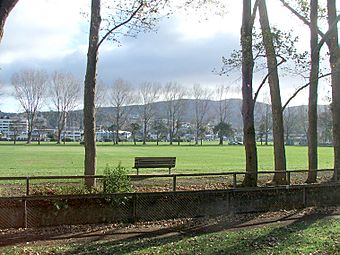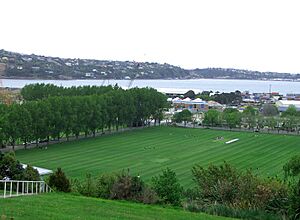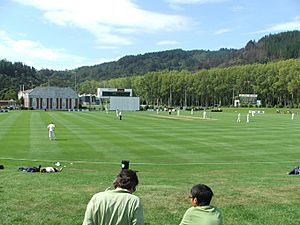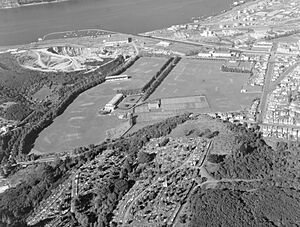Logan Park, Dunedin facts for kids

Logan Park, looking east, with the Otago Polytechnic visible in the distance to the left
|
|
| Location | Dunedin, New Zealand |
|---|---|
| Owner | Dunedin City Council |
| Type | Stadium Complex |
| Genre(s) | Sporting Events |
| Construction | |
| Broke ground | 1913 |
| Opened | 1920 |
| Renovated | 1979 |
| Expanded | 2004, 2012 |
| Tenants | |
| Otago cricket team New Zealand national cricket team |
|
Logan Park is a super cool sports area in Dunedin, New Zealand. It's a special place because it was built on land that used to be a lake! This land was "reclaimed," meaning it was filled in to create new ground. Today, it's a busy hub for many different sports and activities.
What You'll Find at Logan Park
Logan Park is packed with places to play sports. You can find fields for football and rugby. Some of these fields have real grass, while others have special artificial turf. There are also two artificial fields for field hockey, plus bowling greens and tennis courts.
The park is also home to some important stadiums. The University Oval is a big stadium where the University of Otago Rugby Football Club plays. It's also a key spot for Otago Cricket. Another stadium, the Caledonian Ground, is used for athletics and is Dunedin's main place for soccer games. Close by, you'll find the huge Forsyth Barr Stadium at University Plaza, which hosts many different events.
Logan Park is located at the edge of a plain, with beautiful forested hills on its northern and eastern sides. These hills are part of Signal Hill. A small stream, the Opoho Creek, flows along the park's eastern side. Right next to the park, you'll find the Otago Polytechnic campus. The University of Otago's College of Education and the Forsyth Barr Stadium are also nearby.
How Logan Park Was Made
Logan Park has an interesting history! It used to be a part of Otago Harbour called Pelichet Bay. But this bay often filled up with mud and sand. This problem got worse after a special road, called a causeway, was built for the South Island Main Trunk Railway. This railway connected Dunedin to Port Chalmers.
So, people decided to "reclaim" the land. This means they filled in the bay to create new land. This big project started in 1913 and continued after World War I. After the land was ready, it was connected to the city center by a tree-lined road called Anzac Avenue.
In 1925, the reclaimed land was used for a huge event called the 1925 New Zealand and South Seas Exhibition. Many buildings were put up for this exhibition. Today, only two buildings from that time remain: the old Dunedin Public Art Gallery building and the Otago Lawn Tennis Association building. Soon after the exhibition, the area was turned into the playing fields we know today as Logan Park.
Logan Park is a very important and busy place. It's close to two major learning centers: the Otago Polytechnic and the University of Otago. It's also near one of the city's biggest high schools. This makes it easy for many students and people to use its sports facilities. In November 2019, a brand new artificial field, called 'Logan Park Turf', was officially opened by famous football player Juan Pablo Ángel.
See also
- Caledonian Ground
- University Oval
 | Georgia Louise Harris Brown |
 | Julian Abele |
 | Norma Merrick Sklarek |
 | William Sidney Pittman |




